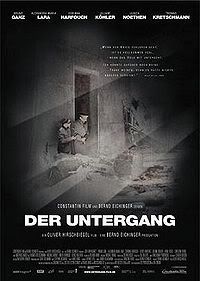
When I saw "Blind Spot: Hitler's Secretary" in 2002, I felt it was one of the best documentaries I'd seen. To this day, I still feel that it is one of the best character focuses done in a documentary (rivaling "The King of Kong" and "Mr. Death: The Rise and Fall of Fred A. Leuchter Jr."). That's why I anticipated the opportunity to catch this film in theatres (for the film is based largely on secretary Traudl Junge's accounts). Alas, at the time, our theatre was embroiled in a legal battle with Newmarket, so "Downfall" never saw the light of day in Louisville. A pity too, for it's easily one of the best films 2006 had to offer.
So many films set during WWII focus on sympathetic protagonists ("The Pianist," "Mrs. Miniver," "Schindler's List") or heroes and epic battles ("Saving Private Ryan," "The Dirty Dozen," "The Great Escape," etc). Director Oliver Hirschbiegel picked a unique setting - Germany during its last two weeks in the war. The last vestiges of Nazi power are confined to a bunker in the center of Berlin as the city is bombarded by Russian forces. Despite the inevitable conclusion of the war, Hitler remains more deluded than optimistic that the German forces will turn the battle around. As the last of the German forces are destroyed, we're left with a sad portrait of some of history's most nefarious leaders as they contemplate and carry out their ends.
To make a film where the audience actually begins to feel a shred of pity for Hitler is certainly impressive. Hirschbiegel is even conscious enough to fill the screen with figures of Jews slain at the dictator's behest and casualties that were the result of the war, as if to remind viewers at the end of the film that Hitler was "the bad guy." However, Bruno Ganz portrays Hitler as a very upset, betrayed and...well, human individual to such a degree that it's hard not to sympathize with him at some point. It would have also been quite easy to make Hitler's collapse the primary objective of the film, but the story continues long after the Fuhrer commits suicide. At its core, the film is a depiction of the downfall of Germany as a world power as seen through the eyes of Traudl Junge, the one person that personally saw the end of the Nazi regime and lived to tell about it. With such an amazing life story, I suppose it would take a large effort to make it anything less than enthralling.
Watch the Trailer

No comments:
Post a Comment